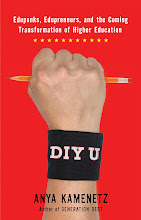Credit card companies are canceling your account . Student loans, home mortgages, and auto loans are all getting harder to obtain, and the big bank where I have an account is insolvent; how about yours?
Starting today, a range of next-generation financial services companies, all of whom employ technology in innovative ways, have teamed up to market some much-needed help to consumers with the Uncrunch America campaign. Like a team of of financial Superfriends, Lending Club offers personal loans through a peer-to-peer model, Virgin Money (yes, a pro-social for-profit offshoot of the Branson empire) has peer-to-peer mortgage financing, OnDeck Capital offers small business loans with a proprietary holistic scoring model, CreditKarma has credit score tools, and Geezeo offers personal finance and budgeting tools.Since the beginning of the year, UnCrunch members have lent almost $75 million to each other.
The site has an overwhelmingly grassroots, patriotic feeling and look, as though it were a stray page from MoveOn.org or recovery.gov. "The American people will solve the credit crisis by helping each other," it proclaims.
Does this fine-sounding premise hold up? Peer-to-peer lending is one of the oldest ideas in finance. In its online incarnation, it doesn't have anything like the volume yet to fill the trillion-dollar gap in the consumer credit market. But it does offer an intriguing alternative to the standard profit-happy credit model, and it's been spreading as a close cousin of the microfinance or social lending movement. As a niche both for borrowers shut out of the credit market and for investors looking for a better return than the stock market can offer, it's likely to grow.
via Uncrunch America




